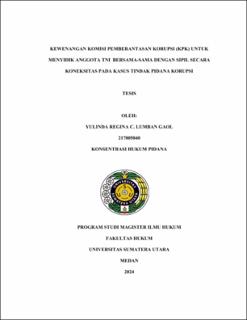| dc.contributor.advisor | Syahrin, Alvi | |
| dc.contributor.advisor | Ikhsan, Edy | |
| dc.contributor.advisor | Trisna, Wessy | |
| dc.contributor.author | Gaol, Yulinda Regina C Lumban | |
| dc.date.accessioned | 2025-01-20T03:35:53Z | |
| dc.date.available | 2025-01-20T03:35:53Z | |
| dc.date.issued | 2024 | |
| dc.identifier.uri | https://repositori.usu.ac.id/handle/123456789/100317 | |
| dc.description.abstract | Based on Article 42 of Law Number 30 of 2002, KPK is also given the authority
to coordinate and control investigations and prosecutions of criminal acts of
corruption carried out jointly by persons subject to the General Court and Military
Court. However, in practice KPK experiences problems in implementing its authority
to investigate connectivity cases, as happened in the Basarnas case. There are
multiple interpretations of views regarding whether KPK has the authority to
investigate TNI and civilian members with connectivity procedures in a court.
To research above-mentioned legal issues, the researcher used normative legal
research method with descriptive-analytical framework. Researcher used a statutory
approach and a conceptual approach. Researcher used theory of of lex specialis,
authority theory, and criminal policy theory as analytical tools. This research uses
primary, secondary and tertiary legal materials. The data collection technique used is
through literature study where the data collected is grouped according to each
problems, and then analyzed qualitatively so that conclusions can be drawn.
KPK experiences problems due to the lack of clear procedures for implementing
the authority to investigate cases in connectivity and the lack of harmonization of
regulations/policies with other related agencies which also have authority in
connectivity cases. The harmonization that is needed is a change in the definition of
"military crime" in the Military Justice Bill, changes to KPK laws and regulations
related to the KPK's organizational structure, and changes to the agency of origin for
KPK investigators/prosecutors which so far can only be filled by the National Police,
Prosecutor's Office and PPNS. It is necessary to have a special Deputy for handling
connectivity cases as well as a KPK Investigator who comes from the military to help
implement the authority to handle connectivity cases at the KPK institution in
accordance with Article 42 of Law Number 30 of 2002. | en_US |
| dc.language.iso | id | en_US |
| dc.publisher | Universitas Sumatera Utara | en_US |
| dc.subject | Investigative Authority | en_US |
| dc.subject | Corruption Crimes | en_US |
| dc.subject | Connectivity | en_US |
| dc.subject | Corruption Eradication Commission | en_US |
| dc.subject | Indonesian National Army | en_US |
| dc.title | Kewenangan Komisi Pemberantasan Korupsi (KPK) untuk Menyidik Anggota TNI Bersama-Sama dengan Sipil Secara Koneksitas pada Kasus Tindak Pidana Korupsi | en_US |
| dc.title.alternative | The Authority of the Corruption Eradication Commission (KPK) to Investigate Military (TNI) Members and Civilians Connectively in Corruption Criminal Cases | en_US |
| dc.type | Thesis | en_US |
| dc.identifier.nim | NIM217005040 | |
| dc.identifier.nidn | NIDN0031036302 | |
| dc.identifier.nidn | NIDN0016026304 | |
| dc.identifier.nidn | NIDN0123018601 | |
| dc.identifier.kodeprodi | KODEPRODI74101#Ilmu Hukum | |
| dc.description.pages | 224 Pages | en_US |
| dc.description.type | Tesis Magister | en_US |
| dc.subject.sdgs | SDGs 16. Peace, Justice And Strong Institutions | en_US |


